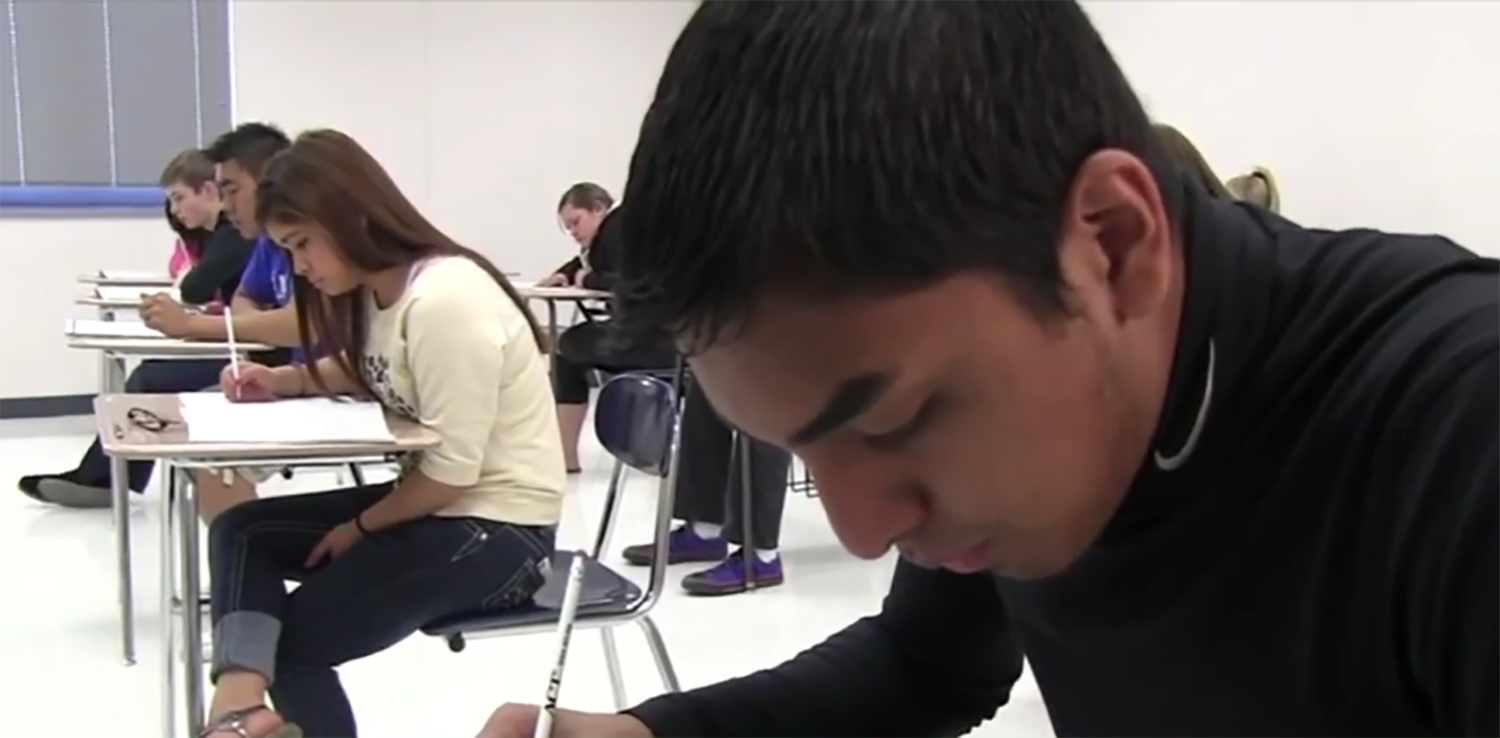SCOTUS agrees to hear Janus case on fair share fees
COLUMBUS – September 28, 2017 – The following statement can be attributed to Ohio Education Association President, Becky Higgins:
“The decision today by the US Supreme Court to hear arguments in the case of Janus v. AFSCME is part of a long-standing effort by wealthy special interests to tilt the playing field even more in their favor by weakening unions that give working people a path to the middle class and provide economic stability to the communities in which we live. An adverse ruling could also hurt Ohio’s public schools by diminishing the ability of educators to advocate for learning conditions and curricula that best serve the needs of the students.”
The Ohio Education Association (ohea.org) represents 124,000 teachers, faculty members and support professionals in Ohio’s public schools, colleges and universities
Follow OEA @OhioEA on Facebook, Twitter, YouTube, Instagram, and Pinterest.
Save
Save
Save
OEA Awards and Scholarships

OEA is pleased to celebrate, honor, and reward the outstanding work of our members, affiliates, and individuals who have made special contributions to the improvement of public education.
For an application or nomination form, visit the OEA website at www.ohea.org, under AFFILIATE RESOURCES, and select the Grants & Scholarships link.
The deadline for all applications is January 31, 2025.
- OEA BLUE RIBBON ASSOCIATION AWARD | The OEA Blue Ribbon Association Award recognizes a local OEA affiliate for its demonstration of innovative problem- solving techniques and/or unique public relations and communication skills. CLICK HERE TO APPLY
- GLATT/HOLLOWAYS AWARD | OEA recognizes achievements in human relations and related intercultural activities that impact children, communities, the educational process, and/or the United Education Profession by presenting the OEA Glatt/Holloways — Human and Civil Rights Award. CLICK HERE TO APPLY
- DORIS L. ALLEN AWARD | OEA recognizes achievements in human relations and related intercultural activities that impact children, communities, the educational process, and/or the United Education Profession by presenting the OEA Doris L. Allen — Human and Civil Rights Award. CLICK HERE TO APPLY
- ESP AWARD | The Education Support Professional Award is presented each year to an OEA member whose activities reflect the contributions of education support professionals to public education. The recipient must have been a member of OEA for three years as of July 15 of the award year. CLICK HERE TO APPLY
- ESP ASPIRING TEACHER SCHOLARSHIP | The $4,000 ESP Aspiring Teacher Scholarship is presented each year to an ESP member currently enrolled in an undergraduate teacher education program in Ohio or a senior education student who has been formally accepted for graduate study in a master’s degree of education program at an accredited Ohio college or university. Applicants must be current members of the Ohio Education Association. CLICK HERE TO APPLY
- OEA FRIEND OF EDUCATION AWARD | The OEA Friend of Education Award recognizes a person and/or organization whose leadership, actions, and support have contributed to the improvement of public education on a statewide and/or national level. CLICK HERE TO APPLY
- JEAN KERSHAW SCHOLARSHIP | The $2,000 Jean Kershaw Scholarship is presented each year to a student member currently enrolled in an undergraduate teacher education program in Ohio or a senior education student who has been formally accepted for graduate study in a master’s degree of education program at an accredited Ohio college or university. Applicants must be current members of the Ohio Student Education Association and the NEA Aspiring Educator Program. CLICK HERE TO APPLY
- JFK SCHOLARSHIP | The $4,000 John F. Kennedy Scholarship is presented each year to an OEA member who is a career teacher enrolled in a graduate-level program and in need of financial assistance. CLICK HERE TO APPLY
- MARILYN CROSS SCHOLARSHIP | The $4,000 Marilyn Cross Scholarship is presented to an OEA member and career teacher enrolled in a graduate- level program directly linked to his/ her current area of licensure. CLICK HERE TO APPLY
- MEDIA AWARD FOR PUBLIC SERVICE | The Media Award for Public Service recognizes an individual and/or organization for a major contribution to the better understanding of the problems, progress, and needs of public education, or for programming of an outstanding educational nature. CLICK HERE TO APPLY
- OEA PEACE AND INTERNATIONAL UNDERSTANDING AWARD | OEA recognizes individual members and local associations who have furthered the cause of peace and international understanding by presenting the OEA Peace and International Relations Awards. CLICK HERE TO APPLY
Save
Save
Save
Save
Save
Save
Save
Successful member organizing helps Maysville EA become first Ohio local to win back salary schedule
 In 2014, midway through the freeze, the administration presented MEA with a “white knight” solution known as alternative compensation developed with the guidance of Battelle for Kids, a non-profit organization intent on tying teacher employment and pay for performance based upon student test scores.
In 2014, midway through the freeze, the administration presented MEA with a “white knight” solution known as alternative compensation developed with the guidance of Battelle for Kids, a non-profit organization intent on tying teacher employment and pay for performance based upon student test scores.
Still reeling from stagnant wages and the defeat of SB5, members made the short-term decision to accept the alternative compensation proposal that came packaged with sweeteners and incentives, many of which were grant-based. Despite warnings from the local’s OEA labor relations consultant that the inequities of the system would be revealed once grant money disappeared, and that a return to their salary schedule might be impossible, 95% of voting members accepted the new compensation plan and, ultimately, its failures.
This year the exit of prior school district management and hiring of a superintendent who was not a strong advocate of tying teacher pay or evaluations to student test results, encouraged a group of MEA members to pursue a return to a traditional pay scale—used by 97% of Ohio school districts.
According to MEA President Myra Warne this was no small challenge for a local with 140 members in rural southeastern Ohio. “Nobody could remember the last time more than 25 or 30 people had come to a meeting,” Warne said. “And, as is often the case with small locals, previous negotiations had been informal and often occurred without the benefit of labor experts at the table.”
As newly elected MEA president, Warne, an English teacher at Maysville High School, promised member involvement and transparency in the process, recognizing that neither would be possible unless teachers were willing to unite behind the goal of achieving an equitable contract that would serve the best interests of all members.
“Nearly a quarter of our members were doing better with merit pay than they would have with the traditional system,” Warne said. “Some wouldn’t receive a raise if MEA returned to the old salary schedule because they had passed the top rung, but the other 75 percent of members had seen their pay stagnate for years. We had to convince those who were benefiting from the new system to support our efforts with the understanding that when management pits us against one another, it’s bad for the union as a whole.”
The MEA Executive Committee recognized that achieving its goal would require a plan to foster member engagement, beginning with a negotiations committee. An all-call for negotiating committee members produced 10 volunteers from different work areas and buildings who agreed to meet weekly, beginning in January 2017.
At the initial meeting, the team developed a plan with each committee member assigned an article of the existing collective bargaining agreement for review and recommendations. With the help of the local’s new LRC Jeremy Baiman, the group dissected the agreement, focusing on key areas. The team sought input from non-committee members in specific disciplines such as special education.
The group then took the unprecedented action of opening every article of the contract, something that had not been done in decades. They discovered a clause suggesting that the superintendent had the right to determine whether a teacher who had given birth was emotionally fit to return to work. In other areas, such as family medical leave, contract language was in violation of federal law.
Committee members were assigned review of specific articles. They also examined contracts from other locals and survey responses from MEA members, and made recommendations based on their research. After discussion, the group agreed on bargaining priorities.
Another critical step was analyzing the district’s spending and financials. On behalf of the MEA, the OEA filed a Freedom of Information Act request for all district salaries and compensation that revealed wide disparities in pay.
Warne said the committee found one teacher who would need to work 21 years under the alternative compensation plan to reach a salary of $51,500—the amount earned by the district’s executive secretaries. The member agreed to serve as a poster child for MEA’s efforts.
“It wasn’t enough to just say, ‘This is good for young teachers,’” Warne said. “We made sure we had permission to use member names, both at the bargaining table and with other members, so that we would have concrete examples.”
MEA’s research also revealed that the district was
top-heavy in administrative salaries—employing 17 administrators at a cost of $1.5 million to taxpayers, compared to 12 administrators in a similar-sized neighboring district. The union’s analysis of the district’s financials showed that the year it implemented merit pay, Maysville saved $700,000 in staff payroll. While the district was pleading poverty, its books showed $1.3 million in revenue over expenses.
Warne said, “exposing and highlighting these financial disparities engaged members, but we needed a strategy to sustain engagement and support throughout the bargaining process to ensure our success.”
Regular communication was key to providing the transparency promised to members early in the process. Committee members secured personal email address and cell phone numbers for each member and contacted teachers to collect accurate information regarding years of service and education levels.
Determining the cost for MEA’s proposal was crucial to securing a deal and math teacher Amber Williams spent hours creating formulae and manipulating data with respect to various counter proposals on compensation.
Communications team members Toni Stoepfel and Samantha Mitts kept members informed in real time, sending emails and text messages updating teachers on the progress of negotiations, and encouraging them to show solidarity by wearing member shirts, participating in group walk-ins, and wearing daily assigned colors to demonstrate unity.
Committee members were motivated and encouraged when, on the first day of negotiations, teachers showed up at school in MEA shirts and posted group pictures
to Facebook.
“As negotiations continued, we received motivational texts and emails from appreciative members, demonstrating the real reward—the fact that we were working hard on behalf of all members,” Warne said.
MEA kept members informed of the substance of negotiations and made sure they were involved in key decisions.
“After the first two days of bargaining, in which the district insisted on maintaining the merit pay system,
we told their negotiating team we needed member input before we could proceed,” Warne said. “On May 9, we held a meeting attended by two-thirds of our members—absolutely unheard of in our district—and presented members with three choices: continue to fight for the traditional step system; acquiesce to the alternative compensation scheme, but try to get a better deal; or work with the administration to come up with a combination of the two.”
Attendees voted soundly (91%) to continue MEA’s fight to regain the traditional pay scale, and the committee secured petition signatures from 87% of all members, signaling that they would do whatever it took to achieve the desired result.
A turning point for MEA was the attendance of 90 members at a school board meeting—so many members that the school board hired a deputy sheriff to attend the proceedings.
Bargaining concluded June 2 with a return to the traditional pay scale—making MEA the first local in Ohio to win back its salary schedule after giving it up.
Additional contract gains included a grandfather clause, ensuring that members who had exceeded their step-based salary would not take a pay cut, financial penalties for the district for exceeding class size targets, and additional release days for our special education teachers. The lone concession was an agreement to add 15 minutes to the workday, bringing Maysville into alignment with other local districts.
The contract was ratified with a 91 percent yes vote.
Preparation, communication and unity were the keys to MEA’s success.
“We began preparations early, sought member input and engagement in the process, created an expectation that our members would support these efforts, and refused to back down at the table,” Warne said. “Countless hours of preparation and research resulted in a successful negotiation for our local.
“We were willing to do the hard work required to negotiate a meaningful contract that serves all our members. It is this unity that brought us success. Our challenge is to maintain that solidarity and continue to develop relationships among members going forward.”
There’s still too much testing
Testing has long been misused to the point where it has lost any potential usefulness in the education of our nation’s children. Questions have been raised by parents and educators not only about the amount of testing that takes place, but also the developmental appropriateness. Then there’s the extent to which test results have created a very lucrative and profitable business market. See The Testing Industry’s Big Four and Pearson Rakes in the Profit.
Since at least 2011, there have been clear indications, cited by Dr. Linda Darling Hammond* in Getting Teacher Evaluation Right of significant errors in the use of Value Added Models in teacher evaluations. See http://bit.ly/getting-teacher-evaluation-right.
We do not need tests to tell us that poverty, inequitably funded schools, lack of access to technology, unaccountable charter schools, trauma, poor professional development, large class sizes and too much time on tests all negatively affect students.
More needs to be done to roll back mandatory assessments to a minimum federal level. That requires that we all advocate clearly and consistently with our elected officials using research and our personal experiences. The opportunity is here. Ask your local to conduct a testing audit. Adopt a resolution to limit vendor testing at the local level. Use all the tools at your disposal — phone calls, letters, emails, etc. — to persuade legislators, state board members and/or local board members on the issue. It’s going to take all of us.
* A Footnote – Dr. Linda Darling Hammond will be the keynote speaker, presenter and facilitator of a panel at the Midwest Symposium on Teacher Evaluation on September 30th at the University of Findlay. Consider attending and engaging further on this topic for change. Registration can be found at https://www.findlay.edu/education/graduate-programs/Midwestern-Teacher-Evaluation-Conference.
Watch OEA President Becky Higgins tell ABC6 what’s missing in Ohio’s report cards.
September 2017 Ohio Schools
- IN THIS ISSUE
- Educators and students at center of work to find solutions to Ohio’s growing opioid crisis
- The 2017 OEA Summer Academy
- Maysville EAs successfully organizes to become first Ohio local to win back salary schedule
- Legislative Update, Political Action, and more.
Moved recently? Contact the OEA Member Hotline to update the address on file at 1-844-OEA-Info (1-844-632-4636) or email, membership@ohea.org. Representatives are available Monday-Friday, from 8:30 a.m. to 6 p.m. | OhioSchools — Past Issues
![]()
![]() Oh Yes, We’re Social — Join the Conversation!
Oh Yes, We’re Social — Join the Conversation!
![]()
OEA says new state report cards don’t tell the whole story
COLUMBUS – September 25, 2017 – “The new report cards showing a statewide improvement in student test scores in many but not all areas of the state are a welcome development,” said OEA President Becky Higgins, “as students adjust to new curriculum standards. But the data in the report cards is complicated and doesn’t tell the whole story – namely the socio-economic factors that impact student performance.”
“There continues to be an overreliance on testing in measuring student growth,” said Higgins, “and OEA urges policy makers to find more ways to limit the role of standardized tests so that our students spend less time preparing for and taking tests and are given more time to reap the benefits of learning from our very committed educators across the state.”
“Ohio’s teachers and school support professionals remain focused on inspiring their students to learn and think creatively,” said Higgins. “This commitment to the success of every student regardless of where they live or what their family income may be can be seen every day in classrooms, libraries, cafeterias and school busses across the state.”
The Ohio Education Association (ohea.org) represents 124,000 teachers, faculty members and support professionals in Ohio’s public schools, colleges and universities
Follow OEA @OhioEA on Facebook, Twitter, YouTube, Instagram, and Pinterest.
Educational Support Professionals: Supporting Students at Times of Crisis (webinar)
Wednesday, September 20, 2017
7:00 PM – 8:15 PM EST
Register at http://neaorg.adobeconnect.com/eravuazgk8oq/event/event_info.html
Crisis is common in the lives of students, whether due to a crisis involving a student’s individual family or one that affects the entire school community. These crises have the potential to cause short and long‐term effects on the psychological functioning, emotional adjustment, health, and developmental trajectory of children. Educational support professionals play a vital role in providing important support to students through their individual interactions with students as well as through the impact they have collectively on the school climate. This support promotes students’ understanding of the event, helps them learn coping strategies to accelerate adjustment and minimize their distress, and minimizes maladaptive coping mechanisms and behavioral difficulties. The presentation will provide practical suggestions on how to identify common adjustment difficulties in children in the aftermath of a crisis and to promote effective coping strategies to reduce the impact of the crisis.
The presenter, David J Schonfeld, MD, established and directs the National Center for School Crisis and Bereavement at the University of Southern California Suzanne Dworak‐Peck School of Social Work. He spoke on a different, but related topic (Supporting the grieving student) at a prior webinar. He will draw on 30 years’ experience in school crisis response to provide examples and answer questions from participants.
INTENDED AUDIENCE:
NEA affiliate leaders, staff, members and partners. All interested parties are welcome. You are encouraged to forward this invite to your partners, leaders and other team members.
SPECIAL GUEST:
Dr. David Schonfeld, MD, USC Professor of the Practice of Social Work, Department of Children, Youth and Families
FACILITATOR:
Jessica Brinkley, NEA Sr. Program/Policy Analyst
Questions? Contact Jessica Brinkley at jdbrinkley@nea.org.
For more ESP professional development opportunities visit www.nea.org/esppd.
Save





